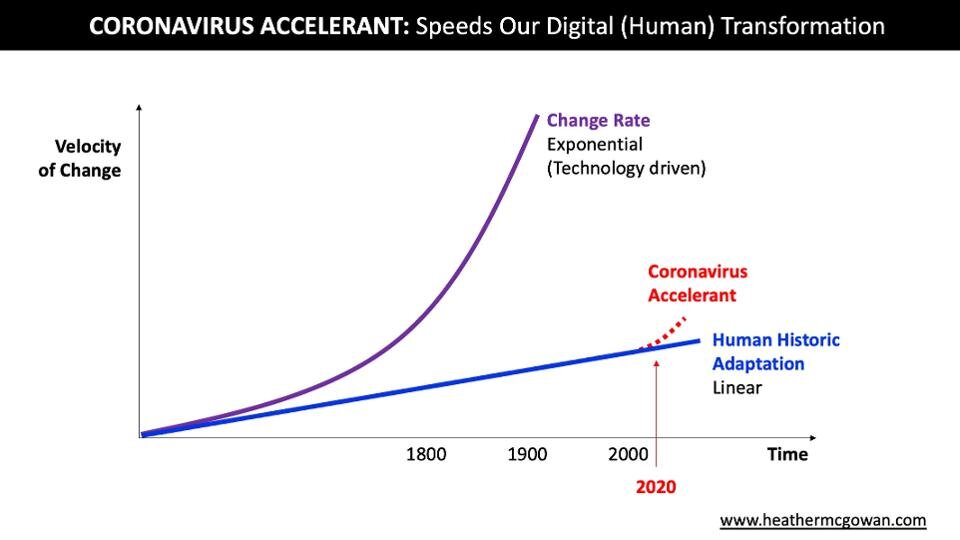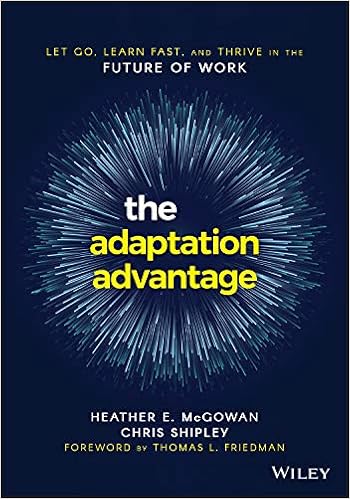
Future-of-work strategist and return podcast guest, Heather McGowan is an in-demand, internationally known thought leader and speaker. She helps leaders prepare their people and organizations with human-centric approaches to continuously learn and adapt in order to meet the demands of the Fourth Industrial Revolution.
She is also the co-author, along with Chris Shipley, of the recently released The Adaptation Advantage: Let Go, Learn Fast, and Thrive in the Future of Work.
In this episode, Jeff talks with Heather about key messages in her book related to adaptation and how it relates to learning, unlearning, and identity. They also discuss what it takes to lead in the age of adaptation, why we need to elevate the role of human over technology, and the fundamental shifts in how we work and learn—now and in the future—due to the coronavirus pandemic.
To tune in, just click below. To make sure you catch all of the future episodes, be sure to subscribe by RSS, Apple Podcasts, Spotify, Stitcher Radio, iHeartRadio, PodBean, or any podcatcher service you may use (e.g., Overcast). And, if you like the podcast, be sure to give it a tweet!
Listen to the Show
Read the Show Notes
[00:18] – A preview of what will be covered in this episode where Jeff interviews Heather McGowan.
Reflection Questions

[01:31] – You might consider the reflection questions below on your own after listening to an episode, and/or you might pull the team together, using part or all of the podcast episode for a group discussion.
- A concept that is very important to how Heather and her co-author Chris Shipley approach adaptation is identity – the sense we all have of who we are and what we do. So, as you are listening, give some thought to how you are helping – or perhaps hindering – your learners in productively managing their sense of identity, and perhaps even letting go of it when necessary.
- Toward the last third or so of the interview Heather suggests that we may see much more of a shift toward a coaching model when it comes to learning experiences. We encourage listeners to reflect on that prediction and consider where coaching might be a good fit for the types of challenges your learners are facing.
[02:43] – Introduction to Heather.
What’s Changed Since Our Last Conversation
[03:21] – It’s been right around two years since our last conversation. I described you as a “future of work strategist”. Could you talk a little bit about what that is, what you actually do with organizations, and maybe how that’s changed over the last couple years?
Heather shares that last time she spoke to us, most of her work was consulting with some speaking and writing. But that evolved, especially in the last year or so to being about 80% speaking, 10% writing, 10% consulting.
What she found was that organizations were hungry for a vision of the future that wasn’t about robots coming for their job, rather one that was human-centric, realistic and optimistic.
We have to make a tremendous shift because we’re coming out of the era where we learned once in order to work and we had a fixed occupational identity. A career could’ve spanned a lifespan or could’ve been shorter, but our careers are now longer because our lives are longer. And then we’ve got this accelerated change cycle driven by technology and globalization, with a new accelerant called the coronavirus ramping up that velocity even more.
As of 2018, Heather says she’s been speaking all over the world and has gained a lot of great insights which led to her recently released book, The Adaptation Advantage: Let Go, Learn Fast, and Thrive in the Future of Work.
Adaptation vs. Flexibility
[05:11] – The Adaptation Advantage seems to be a culmination of your work. And you’ve really focused in on this concept of adaptation, and that being an advantage—if not the advantage right now for all of us living in the world. Talk a little bit about what you mean by adaptation, what that involves, and how that gives us an advantage.
Heather discusses how we’re in the middle of a massive (forced) social experiment right now driven by the coronavirus. And although many of us are working from home, the World Economic Forum showed that only 29% people can actually do this so those that are able to should recognize they are in a place of privilege.
To look at how we adapted, Heather first says we need to understand the concept of adaptation, which she notes is different than flexibility.
Flexibility is really reaching into your toolbox for a different tool (likely one you’ve used before), to attack a process or problem (likely one you’ve seen before).
Whereas adaptation is reaching into your toolbox, pulling out a half-formed tool, and forging the final pieces of it to create a new process and tackle a new problem you’ve never seen before.
So adaptation requires a lot of learning and unlearning. Whereas flexibility is just pivoting between known tools and known processes for known problems.
Role of Identity in Adaptation
[06:51] – Can you talk a little more about the role that identity plays in adaptation?
Heather talks about how identity came up as a factor for her in work a few years ago where she realized kids (she shares an example involving her 4-year-old niece) and students were being pushed to pick a future self, such as choosing what they want to do when they grow up or what to major in when barely stepping foot on campus.
She says this has been done in a very rigid way, based upon what exists today, and in often cases, what existed yesterday rather than what existed today.
Heather cites a statistic from a study of the Federal Reserve Bank of New York on college university majors that found only 27% of people ever work in the field of their college major. So most of us never work in the field we major in or we take learning from our undergraduate education (if we go to university) and adapt it. And she says we need much more of that approach in education, learning, and socialization, particularly because the first thing we ask each other is “What do you do?”.
Studies out of the U.K. and U.S. have found that it takes twice as long to recover from the loss of a job than it does the loss of a primary relationship. It’s the loss of everything you’ve been told you are. Heather says right now, we have at least 26 million Americans who have lost that “who are you?”.

The book gets into how identity is formed, occupational identity, and how we can reframe it. She clarifies that the book isn’t about training for anything, rather it’s really helping you shift your thinking about yourself as a worker, student, and leader—and it’s designed for people to read with their teams.
The identity piece is about the occupational identity, but also about shifting societal and cultural norms that have made it hard for some people to adapt because they feel their personal identity is under threat (racial, gender, religion, etc.).
We have to realize that to learn and adapt, you have to be comfortable being vulnerable. You have to be comfortable saying ‘I don’t know’ in order to learn. And there’s a certain confidence you have to have to be vulnerable, and that’s where the identity piece really comes in.
Unlearning: Identity and Adaptation
[11:14] – Talk a little bit more about unlearning because it seems in many ways an identity is learned. And part of managing identity is unlearning parts of yourself, as well as knowledge and anything else you might be bringing with you. How do you approach unlearning if you’re somebody who wants to be able to adapt?
Heather suggests that first you acknowledge the fact that most of the skills, behaviors, biases, and habits that you have are learned, and that they can be unlearned.
The reason the title of the book has “let go and learn fast” in it is because they want you to think about letting go of the occupational identity traps that have been holding you back.
In terms of unlearning and really practical ways, Heather talks about how in your office you may do things a certain way but then suddenly the process needs to change or your business model changes, and you have to do things in a new way. So you have to unlearn those old processes.
Heather shares that the evil of unlearning (and what she often hears) is “this is the way we’ve always done it” or “we’ve tried that before and it didn’t work”. And even though these might be true, it doesn’t mean in the future a different way isn’t possible.
The Role of Leader in the Age of Adaptation
[12:42] – You referenced being a leader in all of this. Is leadership fundamentally changing? It seems like a lot of leadership now needs to be about helping people recognize the need to adapt as well as helping them with that process of adapting.
Heather discusses how she interviewed Jim Kouzes (author of The Leadership Challenge: How to Make Extraordinary Things Happen in Organizations with 30-40 years of research around leadership) for the leadership sections of the book. He said there isn’t anything that’s true now that wasn’t true when he wrote the first edition of the book, but the focus and intensity on what was important then, is so much more intense now.
Heather explains that focus as a leader should be around:
- Checking in on the well-being of your team. This is really important particularly given the mental health crisis we have in our country and the current stress we are all facing related to the pandemic.
- Establishing trust. Particularly as we’re working in distributed teams, trusting your team to do the work or mission that you’ve agreed upon for the work that you’re doing.
- Establishing psychological safety. This is a term that Dr. Amy Edmondson from Harvard coined about 20 years ago. It’s about moving humans from depersonalized units of productivity to inspiring human potential. This is a very different proposition, especially with the onset of the virus which is putting more stress on individuals.
The Role of Machines in Learning and Adaptation
[15:50] – You mentioned in the beginning, about fear of the robots. How do robots, machines, and artificial intelligence fit into our learning, unlearning, and adaptation?
Heather discusses there are ways in which we have been handing off tasks to machines, such as storing contacts, which we’ve now outsourced to our phones.
So we’ve outsourced certain functions and adapted in certain ways but every time we hand something off to technology, we should be reaching up or over to learn a new skill—which she doesn’t think we’re doing quite enough. And that’s where technology fits in to learning and adaptation.
In this particular moment Heather says she’s actually a little surprised we aren’t using technology more to keep human workers safer. She recognizes we are using a tremendous amount of technology on the science side to simulate the flattening of the curve, viruses, what vaccines may or may not work, etc.
But within organizations, Heather thinks we should look at technology to augment the human, not replace the human. This is because there are all sorts of things technology can’t do.
For example, they can’t decipher intent very well and they aren’t as good at making meaning as we are with each other.
But if we embrace and elevate this role for the human and have a learning-centric focus for it, Heather thinks we’ll be in really good shape.
She adds that the last couple of decades has been about shareholder value, so we have treated humans like a cost to contain rather than an asset to develop. Her hope is that this pause is a moment where we rethink that.
Fundamental Shifts as a Result of the COVID-19 Pandemic
[18:43] – You’ve referenced the current situation a number of times and this is one of a number of conversations we’ve had in the midst of the COVID-19 pandemic. Do you see this as in inflection point? Are things going to be fundamentally different after this?
Heather acknowledges that things were already fundamentally different a week or two later. In the first 14 days, everyone who could teach online did teach online and most schools in some form or fashion are online. They’ve had varying degrees of success, but it’s been much greater than people thought possible.
So we’ve gotten over that fear hurdle and even if it’s not perfect and we’re not going to do everything online, we now know that we can do a lot.
But we have to think differently if we’re going to live in a world of continuous pandemic (which is possible) about how we protect those people with high human interactions.
Heather says that it’s interesting how quickly our shift in what’s possible changes. And suddenly we have this shift on the “what’s important to me” versus “what’s important to the we”, and that’s a way in which she thinks things are going to change around work.
[20:27] – How much do you think things will snap back? When this is all over, are we just going to revert back?
Heather thinks in some ways we will revert back because we’re humans and we want to be with other humans. Personally, she wants to go to a baseball game, ride the subway in NY, and be able to fly, something she used to do 5-6 times a month for work which has been a real lifestyle change for her.
She shares how (because she can’t travel) she’s been doing a lot of virtual talks in addition to podcasts. And one of things she can do on virtual is poll the audience and get anonymous feedback. This has given her another insight and another way of engaging with the audience which she couldn’t do when she was standing on a stage.
Some other advantages she notes are that the planet is doing better without all of us driving and flying everywhere. Keeping that in mind, Heather thinks we might make some more mindful decisions.
So some things will snap back because we are a capital society, but she thinks some of these strides have made us think differently about fellow workers. She references a study that shows there’s been a brand shift in how we think about companies. If companies aren’t really great to their workers, we’re going to be less likely to use them now and in the future.
Supporting Lifelong Learning in a World of Adaptation
[22:52] – For somebody who is a lifelong learning/continuing education provider, when you’re talking about helping people adapt, helping organizations adapt, or potentially helping whole fields and industries adapt—what would you advise those organizations to be doing differently (or at least thinking about differently) to support lifelong learning in this world of adaptation?
Heather predicts we’ll see more and more of a shift towards a coaching model. We know how to deliver the content and the skills but it’s about how you help someone when they get stuck, whether because they hit a wall and can’t figure something out and they get demotivated; or because they’re just not motivated to get started.
If you’re going to have to learn and adapt for life—and she believes you will—over what is now a career that will be (at least) a decade longer, Heather stresses that you need to connect to the motivational drive that’s internal, not external. And she thinks that’s around curiosity, purpose, passion.
Heather shares that she interviewed Kate O’Keeffe from Cisco’s CHILL Lab for the book and that she said you need to think about yourself like a prototype in beta and always be testing and iterating on it.
For the learning organizations out there, she doesn’t think there’s ever going to be a better time to be in learning than in the next couple of decades ahead.
A study by IBM showed that 120 million people worldwide need to be reskilled in the next three years.
Heather says this is a profound opportunity but it’s a matter of meeting people where they are and helping them get a little unstuck so they can see themselves. And she thinks there’s much more coaching and human interaction in that.
Jeff points out that we tend to think of people’s motivations and interests when they are school-aged but it’s important for adults as well. And this goes back to identity and how we personally need to be tapping into that sense of identity. As learning leaders we need to help our learners recognize and reshape their identity over time.
Heather shares how drastically her career has shifted over time and that it’s about being open and listening to what interests you, what energizes you, and where you’re applying your superpowers. Having an advisory board, a series of mentors, and being open to feedback are all important.
But as learning organizations, she says to look at where you can embed that in so you’re not just selling a course or training. Rather you’re helping transformation happen at the real personal level.
[27:25] – What do you personally find challenging about adaptation and how are you working personally to become a better adapter?
Heather is brutally honest and admits that she’s done a lot of adaption but that she’s not that good at it. She talks about how, in the midst of not being able to do talks in person, she still hasn’t figured out how to maximize her message yet in talking virtually, and she knows she needs to get better. She describes how it can be very overwhelming and recognizes that it’s happening to all of us (differently).
Something Heather also shares in the book is that getting hard lessons can sometimes be a really huge gift and that “bad medicine” can be good. She stresses that adaptability isn’t always easy and that this is really, really, hard.
[31:35] – How to connect with Heather and/or learn more:
- LinkedIn: linkedin.com/in/heathermcgowan
- Website:https://www.heathermcgowan.com
- Book: The Adaptation Advantage (look on the site to join a virtual book club)
[33:07] – Wrap-Up
Reflection Questions

- How you are helping—or perhaps hindering—your learners in productively managing their sense of identity, and perhaps even letting go of it when necessary?
- Where might coaching be a good fit for the types of challenges your learners are facing?
If you are getting value from the Leading Learning podcast, be sure to subscribe by RSS, Apple Podcasts, Spotify, Stitcher Radio, iHeartRadio, PodBean, or any podcatcher service you may use (e.g., Overcast) as it helps us get some data on the impact of what we’re doing.
We’d also appreciate if you give us a rating on Apple Podcasts by going to https://www.leadinglearning.com/apple. We personally appreciate your rating and review, but more importantly reviews and ratings play a big role in helping the podcast show up when people search for content on leading a learning business.
Finally, consider following us and sharing the good word about Leading Learning. You can find us on Twitter, Facebook, and LinkedIn. We also encourage you to use the hashtag #leadinglearning on each of those channels. However you do it, please do follow us and help spread the word about Leading Learning.
[34:55] – Sign off
See Also:



 The Truth in Learning, Leadership, and Motivation with Matthew Richter
The Truth in Learning, Leadership, and Motivation with Matthew Richter
Leave a Reply